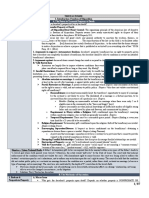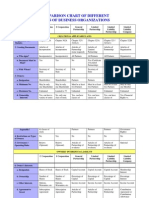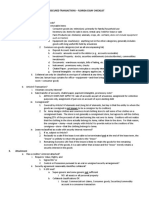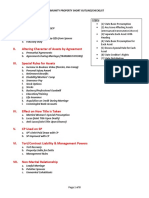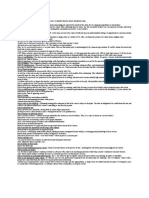Wills and Trusts - Attack Sheet
Wills and Trusts - Attack Sheet
Uploaded by
MissPardisCopyright:
Available Formats
Wills and Trusts - Attack Sheet
Wills and Trusts - Attack Sheet
Uploaded by
MissPardisOriginal Description:
Copyright
Available Formats
Share this document
Did you find this document useful?
Is this content inappropriate?
Copyright:
Available Formats
Wills and Trusts - Attack Sheet
Wills and Trusts - Attack Sheet
Uploaded by
MissPardisCopyright:
Available Formats
WILLS ROADMAP
1.
2.
3.
4.
Execution of Wills
1.
Attested Wills: (1) in writing (2) signed by T (3) in presence of 2 witnesses (4) who also sign
2.
Holographic Wills: (1) signed by T, (2) material provisions in Ts own handwriting
i.
Extrinsic evidence is admissible to determine Ts intent
ii.
Date issues: inconsistent provisions, capacity
Enforcement of Wills
1.
Incapacity (under 18, unable to understand extent of property, know bounty) will invalid
2.
Insane delusion (false belief, product of sick mind, affected will) only affected part invalid
3.
Fraud in the execution (forged signature, didnt know it was a will) will invalid
4.
Fraud in inducement (misrepresentation effects content) only affected part invalid
5.
Undue influence (3 types) generally only affected part invalid
i.
Prima Facie Case: (1) T has a weakness makes him susceptible; (2) wrongdoer had access to T, (4) wrongful act gets the
gift, (5) unnatural result
ii.
Presumption: (1) confidential relationship, (2) wrongful act gets gift, (3) unnatural result
iii.
CA Statutory: gift to (1) drafter, (2) person w/ relation to drafter, (3) person in fiduciary relationship w/ T who also drafted
[devisee gets only their intestate share unless review by independent atty who counsels T].
6.
Mistake words left out no relief, court will not re-write a will
7.
Mistake words added court will strike out those words
8.
Mistake in inducement (act b/c erroneous belief) no relief unless mistake + intent on face
9.
Mistake in description (ambiguity) court will allow parole evidence to determine Ts intent
Revocation of Wills
1.
Revocation: by (1) subsequent will or codicil (explicit or implicit), (2) physical act (need simultaneous intent to revoke), (3) operation
of law (omitted child/spouse or divorce/annulment)
2.
Dependent Relative Revocation (DRR): cancels a revocation where T revoked based on mistaken belief that a subsequent will or
codicil effectuated his intent. If 2nd will does not effectuate Ts intent, the first will was not revoked.
3.
Ademption: where T has devised specially described property and that property is not owned by T at death, the specific gift is
deemed revoked and beneficiary takes nothing unless there is evidence that T intended a general gift.
4.
By satisfaction: an inter-vivos gift to B is deducted from the devise, where the T express in a written document that she intended
the gift to be in satisfaction of the devise.
5.
By advancement: an inter-vivos gift to an heir apparent is deducted from the donees intestate share if the donors intent is
expressed in a written document executed by donor and donee.
Components of Wills
5.
1.
Republication by codicil: will speaks at date of codicil
2.
Integration: (1) papers present at execution, (2) with intent to incorporate
3.
Incorporation by reference: (1) writing in existence at execution, (2) will shows intent to execute, (3) writing sufficiently described
in the will
4.
Facts of independent significance: who a B is, or what gift is given, may be given meaning by facts of significance independent
from Ts will. Allows the court to fill in the blanks in Ts will w/ parole evidence that is trustworthy.
5.
Pour-over wills: where part or all of Ts estate is devised to the trustee of an inter-vivos trust that trust instrument may be admitted
into probate and the pour over provisions effectuated via (1) incorporation by reference or (2) independent significance or (3)
Uniform Testamentary Additions to Trusts Act as long as you have a valid trust, which was executed before or concurrently w/ the
execution of the Ts will, the pour-over provision is valid by statute.
Interpretation of Wills
1.
Rule of lapse: if the beneficiary does not survive T, beneficiaries gift lapses, or fails, unless T expresses a contrary intent in the will.
Passes by residual; if none by intestacy.
i.
2.
6.
7.
8.
If class gifts, only surviving class members take b/c the will speaks at the time of the Ts death. Deceased class
members share will be deemed to have lapsed.
Californias Anti-Lapse Statute: A deceased legatee who is a blood relative of the T or the Ts spouse takes by representation.
Issue of a predeceased devisee may step into the shoes of the devisee, unless will provides otherwise.
Intestate Succession
1.
Share of surviving spouse: (1) all CP, (2) all quasi-CP, (3) all, or of SP
2.
Share not passing to surviving spouse: (1) issue, (2) parents, (3) issue of parents (siblings), (4) grandparents, etc. Distribution:
i.
240: at 1st level shares to all living persons, at 2nd level shares to all living and deceased members of that
generation who leave heirs.
ii.
Per stirpes: distribute to all at 1st level (including deceased). The issue takes in rep.
3.
Special problems: adoption, stepchildren, foster-children, advancements.
4.
Simultaneous death: must prove by clear and convincing evidence heir (or beneficiary) survived decedent (or testator) by 120
hours
Rights of Surviving Spouse and Children
1.
Pretermitted spouse: a will executed prior to marriage, which omits the surviving spouse is revoked as to that spouse, and she/he
will receive her instate share of assets (Ds share of CP and quasi-CP plus up to of Ds SP). Unless: (1) omission was intentional
as shown in will, (2) D provided for spouse by other transfer, or (3) spouse made valid agreement waiving right to share in Ds
estate.
2.
Pretermitted child: a will executed prior to birth or adoption of a child which omits that child is revoked as to that child, and she/he
will receiver her instate share of assets. Unless (1) omission was intentional as shown in will, (2) D provided for child by other
transfer, or (3) D evidenced plan that childs other parent would take financial care of all the couples children.
Bars to Succession
1.
Homicide: a person who feloniously and intentionally kills decedent is not entitled to any benefit from Ds estate by will, trust,
intestacy, life insurance, joint tenancy, etc.
2.
Elder Abuse: a person who is found liable by clear and convincing evidence of abuse will be treated as s/he predeceased
decedent. Includes physical abuse, neglect or fiduciary abuse.
3.
No contest clause: will be enforced unless B, with reasonable cause, brings contest on grounds of forgery, revocation or invalid
transfer to person who drafted instrument.
Trusts Roadmap
1.
2.
3.
4.
Creation of a Valid Trust 7 Elements
1.
Settlor/Trustor Creator who often provides assets to create trust
2.
Delivery handing over property from S to trustee
3.
Trustee person holding legal title to trust property and managing assets
4.
Intent S must intend to create trust in the present (mandatory words)
5.
Trust Property (Res) must be presently existing property interest, not illusory
6.
Beneficiaries person(s) holding equitable title and receiving benefits of assets
7.
Valid Trust Purpose purpose cannot violate law or public policy
Types of Trusts
1.
Discretionary Trust Trustee has discretion to pay income or principal
2.
Mandatory Trust trustee lacks discretion; must pay per terms of the trust
3.
Spendthrift Trust limits voluntary and involuntary alienation
4.
Honorary Trust not a valid trust as lacks human beneficiaries, but trustee can carry out Ss wishes to care for animal, maintain
grave, etc.
5.
Secret Trust Fact of the trust is secret; promise enforceable as a constructive trust
6.
Semi-Secret Trust trustee named but beneficiaries are secret; unenforceable
7.
Totten Trust bank account for benefit of third party
8.
Charitable Trust trust for charitable purpose that benefits large number of unidentifiable beneficiaries (e.g. education, science,
research). Cy pres if general charitable purpose.
9.
Resulting Trust not a real trust implied in fact trust based on presumed intent of the parties. Resulting trustee will transfer
property to the S if alive, if not to residuary, if not to intestate heirs.
Modification and Termination of Trusts
1.
General Rule If S and all Bs consent, trust may be modified or terminated (only while S alive).
2.
The Claflin Doctrine Trust cannot be modified or terminated, even if all beneficiaries agree, if to do so would be contrary to a
material purpose of the S.
3.
Changed Circumstances In Cal. court may modify or terminate trust (upon petition by trustee or B) if changed circumstances
mean continuation in same manner would defeat trust purpose.
Trust Administration and Trustee Duties: Trustee owes fiduciary duty to administer the trust solely in the interest of the beneficiaries. A
breach can mean personal liability for trustee.
1.
Duty of loyalty self-dealing Trustee cannot buy or sell trust assets for trustee or spouse; trustee cannot borrow trust funds. If
trustee engaged in self-dealing, courts apply the no further inquiry rule. Trustees good faith and reasonableness of transaction are
irrelevant.
2.
Duty of loyalty conflict of interest Trustee breaches duty of loyalty by not acting in best interest of beneficiaries. E.g. selling
trust property to buyer just to increase value of Ts own property. Remedies include ratification and surcharge.
3.
Duty of due care trustee must act as a reasonably prudent person dealing w/ his own affairs.
4.
Duty to invest split of authority three alternative rules discuss all three.
5.
i.
State lists: In certain jxs., in the absence of directions in the trust, the trustee must follow a list of good investments.
ii.
Common law prudent person test: The duty to invest requires the trustee to act as a reasonably prudent person
investing his own property, trying to maximize income while preserving corpus. Key: each investment is scrutinized.
iii.
Uniform Prudent Investor Act: Adopted by most states, provides that the trustee must invest as a prudent investor. Key:
Each individual investment is not scrutinized, but, rather, performance is measured in the context of the entire trust
portfolio.
Duties relating to care of trust property:
i.
Duty to collect and protect trust property
ii.
Duty to earmark trust property
iii.
Duty not to commingle trust funds w/ trustees own
iv.
Duty not to delegate investment decisions
v.
Duty to diversify investment
vi.
6.
Duty to account to trust beneficiaries.
Remedies for the beneficiary:
i.
Ratify the Transaction waive the breach if outcome is positive (no netting)
ii.
Surcharge the Trustee sue for any resulting loss
iii.
Trace and recover the property (constructive trust) except if sale to a BFP
You might also like
- Secured Transactions Flow ChartDocument10 pagesSecured Transactions Flow ChartAnonymous vXdxDlwKO89% (9)
- Trusts and Estates Pre-WriteDocument16 pagesTrusts and Estates Pre-Writenblu100% (3)
- Possessory Estates ChartDocument8 pagesPossessory Estates ChartJulia Bienstock100% (11)
- Property Law ChartsDocument10 pagesProperty Law ChartsWilliam Stroud100% (6)
- Wills, Trusts & EstatesDocument59 pagesWills, Trusts & EstatesAílíse Delaney89% (18)
- Sales and Leases Outline FinalDocument64 pagesSales and Leases Outline FinalC.W. DavisNo ratings yet
- Trusts and Estates Altv1Document3 pagesTrusts and Estates Altv1zumieb100% (7)
- Real Property Bar OutlineDocument18 pagesReal Property Bar OutlineJulia Niebrzydowski100% (5)
- Scalise Trusts and Estates Outline Spring 2020Document29 pagesScalise Trusts and Estates Outline Spring 2020Michael Langer100% (2)
- Wills Attack SheetDocument5 pagesWills Attack SheetLissett MartinezNo ratings yet
- Wills and Trust OutlineDocument97 pagesWills and Trust OutlineMariel Tollinchi100% (4)
- Wills Essay Approach 1250107043Document3 pagesWills Essay Approach 1250107043eyehudah100% (1)
- Torts One SheetDocument2 pagesTorts One SheetChris Hamer100% (3)
- Secured Transaction Basic ModelsDocument5 pagesSecured Transaction Basic ModelsElissa Mckee100% (7)
- Business Associations Guttentag Fall 2017Document77 pagesBusiness Associations Guttentag Fall 2017Missy Meyer100% (1)
- Constitutional LawDocument19 pagesConstitutional LawMissPardis100% (1)
- Chapter 1 Succession and Transfer Taxes Part 1Document2 pagesChapter 1 Succession and Transfer Taxes Part 1AngieNo ratings yet
- WIlls and Trusts Essay RoadmapDocument18 pagesWIlls and Trusts Essay RoadmapCamille Walker100% (5)
- Wills Estates and Trusts Outline and Case ChartDocument34 pagesWills Estates and Trusts Outline and Case ChartMichael Mroczka100% (7)
- Trust and Estates OutlineDocument78 pagesTrust and Estates OutlineIsabella Levy100% (7)
- Wills and Trust OutlineDocument12 pagesWills and Trust OutlinejccyuNo ratings yet
- Law School Survival Guide (Volume I of II) - Outlines and Case Summaries for Torts, Civil Procedure, Property, Contracts & Sales: Law School Survival GuidesFrom EverandLaw School Survival Guide (Volume I of II) - Outlines and Case Summaries for Torts, Civil Procedure, Property, Contracts & Sales: Law School Survival GuidesNo ratings yet
- Trust and Estates Attack OutlineDocument18 pagesTrust and Estates Attack OutlineOzzy DentilusNo ratings yet
- Wills & Trusts Outline 2020Document44 pagesWills & Trusts Outline 2020PaulMarieNo ratings yet
- Trusts and Estates: Short OutlineDocument10 pagesTrusts and Estates: Short OutlineJessidoll8100% (1)
- Wills Trusts and Estates Outline Goes With Dukeminier BookDocument71 pagesWills Trusts and Estates Outline Goes With Dukeminier BookEmily Wang100% (9)
- Intestacy, Wills, and Trusts OutlineDocument59 pagesIntestacy, Wills, and Trusts OutlineMissy MeyerNo ratings yet
- Marina-Wills & Trusts Rule StatementsDocument35 pagesMarina-Wills & Trusts Rule StatementsHaifa50% (2)
- Trusts and Estates Outline - THDocument87 pagesTrusts and Estates Outline - THj100% (4)
- Property Attack Sheet (Stanford Law)Document9 pagesProperty Attack Sheet (Stanford Law)Swi Masala Dosa100% (8)
- Business Associations - ChartDocument9 pagesBusiness Associations - Chartmkelly2109100% (1)
- Wills ChecklistDocument3 pagesWills Checklistmarthabin100% (3)
- Con Law Attack SheetDocument24 pagesCon Law Attack Sheetlylid66100% (13)
- WILLS Bar Exam OutlineDocument26 pagesWILLS Bar Exam OutlineJenna Alia100% (2)
- Sec Trans Outline MEE/UBEDocument8 pagesSec Trans Outline MEE/UBEArthur Shalagin100% (2)
- Wills and Trusts OutlineDocument48 pagesWills and Trusts OutlineJohnBarkum33% (3)
- Bar Prep - Outline - Trusts - ShortDocument7 pagesBar Prep - Outline - Trusts - ShortAnonymous Cbr8Vr2SX100% (1)
- Business Associations OutlineDocument68 pagesBusiness Associations OutlineEric EricsNo ratings yet
- Remedies Outline Very GoodDocument13 pagesRemedies Outline Very GoodMonte Bell100% (13)
- Business Associations OutlineDocument51 pagesBusiness Associations OutlineLisa Williams-McCallum100% (3)
- Property Attack Outline 2Document4 pagesProperty Attack Outline 2scott_a_schonfeld88% (8)
- Secured Transactions Flow Chart (Collateral)Document10 pagesSecured Transactions Flow Chart (Collateral)Kathleen Alcantara94% (16)
- Secured Transactions Attack OutlineDocument15 pagesSecured Transactions Attack Outlinemkelly210990% (30)
- Business Associations - Template 2 (Australia)Document14 pagesBusiness Associations - Template 2 (Australia)Marten NguyenNo ratings yet
- Wills I. Intestate Succession in GeneralDocument24 pagesWills I. Intestate Succession in Generalprentice brown100% (2)
- Probate Assets: Property Non-Probate Assets: Gifts Causa Mortis: 3805 ClaimsDocument4 pagesProbate Assets: Property Non-Probate Assets: Gifts Causa Mortis: 3805 ClaimsGavin Lacambra100% (3)
- Property Attack Outline1Document5 pagesProperty Attack Outline1DMStom0% (2)
- Sec. Trans.-Essay-ChecklistDocument4 pagesSec. Trans.-Essay-ChecklistNicole Marie Torres100% (1)
- Family Law MEE Condensed OutlineDocument20 pagesFamily Law MEE Condensed OutlineBen100% (7)
- Torts OutlineDocument64 pagesTorts Outlinetconn8276No ratings yet
- Con Law OutlineDocument25 pagesCon Law OutlineNader83% (6)
- Business Organizations OutlineDocument42 pagesBusiness Organizations Outlinelefty333100% (3)
- BA Attack OutlineDocument4 pagesBA Attack Outlinealexander100% (2)
- Trusts Bar OutlineDocument4 pagesTrusts Bar OutlineJohn RisvoldNo ratings yet
- Bar Prep - Outline - Remedies - ShortDocument11 pagesBar Prep - Outline - Remedies - ShortAnonymous Cbr8Vr2SX100% (2)
- Bar Prep - Outline - Community Property - ShortDocument8 pagesBar Prep - Outline - Community Property - ShortAnonymous Cbr8Vr2SX100% (2)
- Secured Transactions, Governing Law: Law Essentials for Law School and Bar Exam PrepFrom EverandSecured Transactions, Governing Law: Law Essentials for Law School and Bar Exam PrepRating: 3 out of 5 stars3/5 (1)
- Business Organizations: Outlines and Case Summaries: Law School Survival Guides, #10From EverandBusiness Organizations: Outlines and Case Summaries: Law School Survival Guides, #10No ratings yet
- Passing the Uniform Bar Exam: Outlines and Cases to Help You Pass the Bar in New York and Twenty-Three Other States: Professional Examination Success Guides, #1From EverandPassing the Uniform Bar Exam: Outlines and Cases to Help You Pass the Bar in New York and Twenty-Three Other States: Professional Examination Success Guides, #1Rating: 2.5 out of 5 stars2.5/5 (3)
- Business Associations, Law Essentials: Governing Law for Law School and Bar Exam PrepFrom EverandBusiness Associations, Law Essentials: Governing Law for Law School and Bar Exam PrepNo ratings yet
- Reaching the Bar: Stories of Women at All Stages of Their Law CareerFrom EverandReaching the Bar: Stories of Women at All Stages of Their Law CareerNo ratings yet
- BNR-CrimLaw-Excerpt-pg1-3 Writing TemplateDocument4 pagesBNR-CrimLaw-Excerpt-pg1-3 Writing TemplateMissPardisNo ratings yet
- Barbri Mbe AnswersDocument16 pagesBarbri Mbe AnswersMissPardisNo ratings yet
- Van Valkenburgh V LutzDocument1 pageVan Valkenburgh V LutzMissPardisNo ratings yet
- Community PropertyDocument7 pagesCommunity PropertyMissPardisNo ratings yet
- Property Outline: Property Is Composed of A Multiplicity of Rights (Doctrine of Property)Document5 pagesProperty Outline: Property Is Composed of A Multiplicity of Rights (Doctrine of Property)MissPardisNo ratings yet
- Okeefe V SnyderDocument2 pagesOkeefe V SnyderMissPardisNo ratings yet
- Ludwig V Farm Bureau Mutual InsuranceDocument2 pagesLudwig V Farm Bureau Mutual InsuranceMissPardisNo ratings yet
- Constitutional Law - OutlineDocument3 pagesConstitutional Law - OutlineMissPardisNo ratings yet
- King's Bench, 1722. 1 Strange 505 Pages 98-101 Case BookDocument1 pageKing's Bench, 1722. 1 Strange 505 Pages 98-101 Case BookMissPardisNo ratings yet
- Corporations - OutlineDocument5 pagesCorporations - OutlineMissPardisNo ratings yet
- Woodrick V WoodDocument1 pageWoodrick V WoodMissPardisNo ratings yet
- Symphony Space V Pergola PropertiesDocument3 pagesSymphony Space V Pergola PropertiesMissPardisNo ratings yet
- Hinds V BrazealleDocument1 pageHinds V BrazealleMissPardisNo ratings yet
- Insurance OutlineDocument29 pagesInsurance OutlineMissPardisNo ratings yet
- Landlord Tenant LawDocument6 pagesLandlord Tenant LawMissPardisNo ratings yet
- Barbri Mbe AnswersDocument3 pagesBarbri Mbe AnswersMissPardisNo ratings yet
- Criminal Law - Attack SheetDocument4 pagesCriminal Law - Attack SheetMissPardisNo ratings yet
- Professional Responsibility - Attack SheetDocument1 pageProfessional Responsibility - Attack SheetMissPardis100% (1)
- Constitutional Law - Essay OpenersDocument4 pagesConstitutional Law - Essay OpenersMissPardis100% (5)
- Eerie Flow ChartDocument1 pageEerie Flow ChartMissPardisNo ratings yet
- Community Property - Lois SchwartzDocument35 pagesCommunity Property - Lois SchwartzMissPardisNo ratings yet
- Community Property (1) Basic Presumptions: Christin Hill Bar ReviewDocument4 pagesCommunity Property (1) Basic Presumptions: Christin Hill Bar ReviewMissPardisNo ratings yet
- Family Law Matters That Precede Getting Married and Marriage (Least Impt) A. PremarriageDocument6 pagesFamily Law Matters That Precede Getting Married and Marriage (Least Impt) A. PremarriageMissPardisNo ratings yet
- Character EvidenceDocument2 pagesCharacter EvidenceMissPardisNo ratings yet
- Heirs of Rosendo Lasam V. Vicenta Umengan Facts: The Lot Subject of The Unlawful Detainer Case Is Registered in The Names of The Original OwnersDocument10 pagesHeirs of Rosendo Lasam V. Vicenta Umengan Facts: The Lot Subject of The Unlawful Detainer Case Is Registered in The Names of The Original OwnersOleksandyr UsykNo ratings yet
- Davis V Davis 214 SC 247 52 SE2d 192 SC 1949Document9 pagesDavis V Davis 214 SC 247 52 SE2d 192 SC 1949JonahNo ratings yet
- Estates and TrustsDocument2 pagesEstates and TrustsJane TuazonNo ratings yet
- Opened Estates March 4Document5 pagesOpened Estates March 4York Daily Record/Sunday NewsNo ratings yet
- Opened Estates April 8Document7 pagesOpened Estates April 8York Daily Record/Sunday NewsNo ratings yet
- Naguid VS NaguidDocument7 pagesNaguid VS NaguidYasm Roa HonorNo ratings yet
- PVL2602 - Tut201 - Exam DetailsDocument27 pagesPVL2602 - Tut201 - Exam DetailsMercy MercyNo ratings yet
- Republic of The Philippines City of Lipa, BatangasDocument3 pagesRepublic of The Philippines City of Lipa, BatangasMerlo Sebasthian Silva83% (6)
- Marcaida, Capili & Ocampo Recto Araneta & ZaragozaDocument5 pagesMarcaida, Capili & Ocampo Recto Araneta & Zaragozaericjoe bumagatNo ratings yet
- Tax.3410 SuccessionDocument7 pagesTax.3410 SuccessionJUARE MaxineNo ratings yet
- Opened Estates Sept. 15Document5 pagesOpened Estates Sept. 15York Daily Record/Sunday NewsNo ratings yet
- Succession I. General Provisions (774-782)Document61 pagesSuccession I. General Provisions (774-782)Joseph ValenciaNo ratings yet
- A Practical Treatise On The Law of Trusts and Trustees LewinDocument826 pagesA Practical Treatise On The Law of Trusts and Trustees LewinSpencer Barclay100% (8)
- Sumilang VDocument1 pageSumilang VChingNo ratings yet
- G.R. No. 122880 Azuela Vs CastilloDocument3 pagesG.R. No. 122880 Azuela Vs CastilloGRAND LINE GMSNo ratings yet
- Annexure III 01 July 2020 1879461169Document1 pageAnnexure III 01 July 2020 1879461169Rohit PethkarNo ratings yet
- Succession Law Case ProblemsDocument2 pagesSuccession Law Case ProblemsKelvin CulajaráNo ratings yet
- Cases SuccessionDocument20 pagesCases SuccessionYang D. F.No ratings yet
- Coverage: Beginning To Rule 90Document3 pagesCoverage: Beginning To Rule 90Aure ReidNo ratings yet
- Family LawDocument5 pagesFamily Lawavila victoriaNo ratings yet
- Succession JY Notes Pre-Finals (Mod 9-11)Document84 pagesSuccession JY Notes Pre-Finals (Mod 9-11)Jandi YangNo ratings yet
- Claro M. Recto and Serafin C. Dizon For Appellants. Delgado & Flores For AppelleeDocument9 pagesClaro M. Recto and Serafin C. Dizon For Appellants. Delgado & Flores For AppelleeRham VillanuevaNo ratings yet
- Eh 405 Succession Case Digests Module 1 5 CompleteDocument40 pagesEh 405 Succession Case Digests Module 1 5 CompleteJandi YangNo ratings yet
- Estate of Gelacio Sebial - Benjamina Sebial vs. Roberta SebialDocument10 pagesEstate of Gelacio Sebial - Benjamina Sebial vs. Roberta Sebialayam dinoNo ratings yet
- 2018LLB003 - Family Law - Semester 4 - Research Paper (Repaired)Document21 pages2018LLB003 - Family Law - Semester 4 - Research Paper (Repaired)Aishwarya BuddharajuNo ratings yet
- Probate of A WillDocument2 pagesProbate of A WillSDNo ratings yet
- Female Hindu Intestate SuccessionDocument9 pagesFemale Hindu Intestate Successionm sNo ratings yet
- Wills and SuccessionDocument15 pagesWills and Successionjirah cheeNo ratings yet
- Aznar V DuncanDocument2 pagesAznar V Duncannelly casabuenaNo ratings yet




























